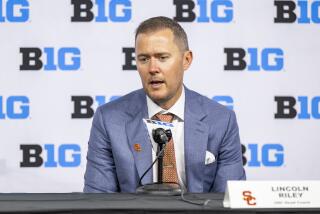Riley Tells Congress Better Education Is Moral Mission
- Share via
WASHINGTON — President-elect Bill Clinton’s nominee for education secretary urged Congress on Tuesday to join him in the “essential mission” of reshaping the nation’s approach to education to assure that all Americans are prepared for the changing world economy.
“Giving our students the best education in the world is a moral imperative and, especially, an economic necessity,” former South Carolina Gov. Richard W. Riley, 59, told the Senate Committee on Labor and Human Resources.
The Department of Education chose the day of Riley’s confirmation hearing to announce preliminary test results showing that nearly 40% of the nation’s fourth-, eighth- and 12th-graders failed to reach basic proficiency in math--although a majority of students did register higher scores than two years ago.
The results underscore the challenges facing the Department of Education, which Riley is poised to take over. Educators and education reform advocates have said that they expect a lot from the new Administration because Clinton and Riley both have strong records as education reformers.
At the confirmation hearing, Republicans and Democrats alike asked Riley to comment on how the Clinton Administration will live up to high expectations for education reform, considering the mounting federal deficit and Clinton’s commitment to reduce it.
“I will attempt to work with him to try to make careful choices sensitive to the deficit problem,” Riley said. But he added that investing in better schooling is vital, because “the education of the young people of this country is the only way to come out of this economic hole we are in.”
While Riley, like most of Clinton’s other nominees, was reluctant to commit to specific programs, he did say that his goals include improving education and training for students not on track to traditional four-year colleges, introducing voluntary national academic standards and assessments and giving more young Americans a chance to attend college by offering loans that can be paid off or forgiven through national service.
In South Carolina, reforms pushed by Riley resulted in vast improvements in test scores, greater employment opportunities for vocational school graduates, rising numbers of students taking advanced placement courses and increasing numbers of graduates going on to college.
The only issue that drew sparks between the Republicans at the confirmation hearing and Riley was the proposal supported by President Bush to give lower- and middle-income families vouchers to attend private schools. Clinton and Riley have already stated that they oppose the concept.
When Republican senators suggested that he reconsider his stance, Riley said: “I am 100% convinced that it is not good for public schools. The bottom half would be terribly disserved to pull large amounts of dollars out of the public schools.”
More to Read
Sign up for Essential California
The most important California stories and recommendations in your inbox every morning.
You may occasionally receive promotional content from the Los Angeles Times.









